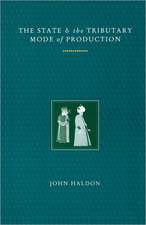The Salaried Masses: Duty and Distraction in Weimar Germany
Autor Siegfried Kracauer Inka Mulder-Bach Traducere de Quintin Hoareen Limba Engleză Paperback – 31 aug 1998
Spiritually homeless, divorced from all custom and tradition, these white-collar workers sought refuge in entertainment—or the “distraction industries,” as Kracauer put it—but, only three years later, were to flee into the arms of Adolf Hitler. Eschewing the instruments of traditional sociological scholarship, but without collapsing into mere journalistic reportage, Kracauer explores the contradictions of this caste. Drawing on conversations, newspapers, adverts and personal correspondence, he charts the bland horror of the everyday. In the process he succeeds in writing not just a prescient account of the declining days of the Weimar Republic, but also a path-breaking exercise in the sociology of culture which has sharp relevance for today.
Preț: 108.99 lei
Nou
Puncte Express: 163
Preț estimativ în valută:
20.86€ • 21.70$ • 17.22£
20.86€ • 21.70$ • 17.22£
Carte disponibilă
Livrare economică 22 martie-05 aprilie
Preluare comenzi: 021 569.72.76
Specificații
ISBN-13: 9781859841877
ISBN-10: 1859841872
Pagini: 122
Dimensiuni: 139 x 218 x 9 mm
Greutate: 0.18 kg
Editura: VERSO
ISBN-10: 1859841872
Pagini: 122
Dimensiuni: 139 x 218 x 9 mm
Greutate: 0.18 kg
Editura: VERSO
Notă biografică
Siegfried Kracauer (1889–1966) was one of Germany’s leading cultural commentators and essayists.
Quintin Hoare is the director of the Bosnian Institute and has translated numerous works by Sartre, Antonio Gramsci, and other French authors. He lives in the United Kingdom.
Quintin Hoare is the director of the Bosnian Institute and has translated numerous works by Sartre, Antonio Gramsci, and other French authors. He lives in the United Kingdom.
Recenzii
“Well before the current vogue of cultural studies, Siegfried Kracauer pioneered a method of ethnographic critique that allowed him to reveal his society’s deepest secrets by decoding its surface manifestations. Perhaps its most stunning fruit was his classic study of the spiritual and material crisis of Weimar Republic’s salaried employees, now happily available in English for the first time. It was this work that earned Kracauer the celebrated sobriquet ‘a ragpicker at daybreak’ from his friend Walter Benjamin, who may have been wrong about the revolutionary day he thought was dawning, but who correctly saw the value in sifting through the remains of the long night that came before and was, alas, to darken still further in the years to come.”—Martin Jay
Descriere
Germany's Siegfried Kracauer (1889-1966) provided a fascinating study--first published in 1930--of German society on the eve of Nazism. The focus of Kracauer's inquiry was the new class of salaried employees who populated the cities of Weimar Germany. Drawing on conversations, newspapers, ads and personal correspondence, Kracauer revealed a down-spiraling of culture which has sharp relevance for today.


















